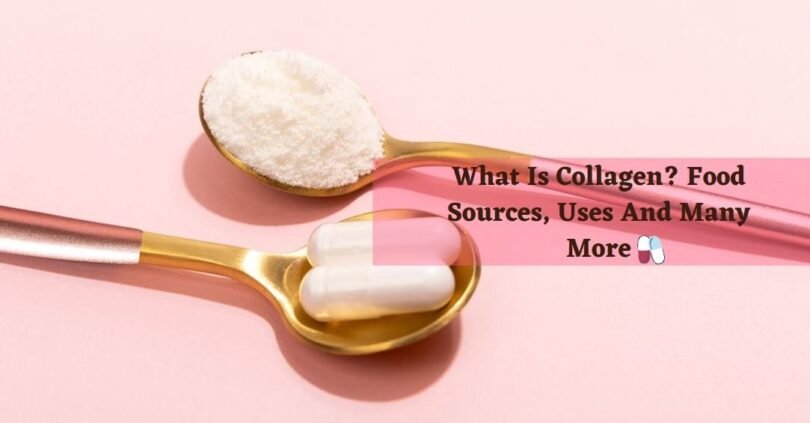One of the newest health buzzwords is collagen. The majority of people are unaware of what collagen is and what it does in the body, despite the fact that the usage of collagen supplements and other collagen products is rising. In an effort to promote anti-aging, reduce the symptoms of wrinkles and arthritis, many are incorporating collagen into coffee, smoothies, and other items. Let’s take a closer look at what collagen is, what it does, how it’s used, and many more.
What Is Collagen?
The protein found in your body in the greatest amounts is collagen. Your body’s skin, muscles, bones, tendons, ligaments, and other connective tissues are all made primarily of collagen. Additionally, it can be discovered in your blood vessels, intestinal lining, and organs.
The proteins are made from amino acids. Proline, glycine, and hydroxyproline are the three major amino acids used to make collagen. In a triple helix structure, these amino acids group together to form protein fibrils. Your body finds it more difficult to produce more collagen as you age because your existing collagen breaks down. Due to this, a lot of people use collagen powder or other collagen supplements like capsules, gummies, and liquids.
There are about 28 different varieties of collagen, and each has a unique structure. The majority are made of fibrils, which are long, thin structures that are robust and flexible.
What Does Collagen Do?
The major function of collagen in your body is to provide it structure, strength, and support. Specific functions of collagen include:
- Assisting the formation of fibroblasts in your dermis (middle layer of skin), which promote the development of new cells.
- Contributing to the replacement of dead skin cells.
- Providing organs with a protective covering.
- Giving your skin elasticity, strength, and structure.
- Facilitating blood to clotting.
Uses Of Collagen
Our body naturally makes collagen, which you can also get from food sources including fish and chicken skin and supplements. For the treatment of aging signs including wrinkles, loss of the hydration of the skin, and joint pain, oral and topical collagen products such as supplements and face creams are well-liked. Collagen is available to purchase in liquid, capsule, and powder form. It can be consumed as a supplement or added to hot and cold beverages, as well as foods like oatmeal, yogurt, and energy balls.
In the medical field, collagen and collagen-based products are also used by healthcare professionals, notably in the treatment of burns, wounds, and diabetic ulcers. Due to its humectant and moisturizing properties, collagen is also used by cosmetics firms in items like serums and moisturizers.
What Are The Best Food Sources Of Collagen?
All animals contain collagen, which is mostly present in the skin and joints of an animal. Presented herein are a few foods rich in collagen are animal bones, skin, and ligaments, including chicken skin and pig knuckles, particular types of seafood, including jellyfish and fish skin, products manufactured from animal parts like ligaments and bones, including bone broth.
Given that collagen is made by your body from amino acids, you can support collagen formation by making sure you’re getting enough protein from foods including poultry, fish, beans, and eggs. Your body needs additional dietary components for collagen formation and maintenance in addition to amino acids.
For instance, since vitamin C is required for the production of collagen, low or inadequate vitamin C levels might affect collagen production. Thus, eating a lot of foods high in vitamin C can assist the healthy production of collagen. A diet rich in advantageous plant compounds may also contribute to better skin health by lowering inflammation and preventing collagen deterioration.
What Causes Collagen Loss?
Low levels of collagen or collagen loss may be caused by a number of factors, including:
- Hormonal changes caused by situations like menopause, pregnancy, and other medical disorders.
- Oxidative stress, which is a result of metabolic processes and lifestyle activities like smoking and diet.
- Aging as it occurs naturally.
- Excessive sun exposure, which can cause the skin’s collagen to break as a result of ultraviolet rays.
- Low levels of ascorbic acid, or vitamin C, which can cause scurvy.
How To Prevent Collagen Loss?
The loss of collagen that comes with becoming older cannot be entirely prevented, but it can be slowed. Here’s how you can prevent collagen loss.
Consume a lot of fruits and vegetables as they are filled with vitamins and antioxidants.
Collagen formation is significantly impacted by excessive alcohol consumption, smoking, ultra-processed food consumption, and diet.
Sun exposure should be avoided at all costs.
It may be possible to support collagen maintenance and general skin health by avoiding or consuming fewer of some beverages and foods while consuming more of others.
Frequently Asked Questions(FAQs)
Is Using Collagen Worthwhile?
As per studies, supplements may increase the body’s production of collagen. Creams that promise to rejuvenate the skin, however, are unlikely to make a major improvement because the molecules can’t effectively penetrate the skin’s outer layer.
What Exactly Does Collagen Do For The Body?
Collagen is necessary for the health of bones, skin, blood vessels, and all organs. Joint issues and a lack of skin elasticity can result from low collagen levels.
What Are The Side Effects Of Collagen Supplements?
Possible side effects include a rash, mild diarrhea, and abdominal heaviness. With other drugs, there can be interactions. Research hasn’t yet revealed which ones, though.
Conclusion
Collagen is necessary for giving your body structure, strength, and support. A diet that is well-balanced should include chicken, beef, fish, dairy, eggs, beans, leafy greens, other vegetables, whole grains, and citrus fruits. Don’t smoke, stay away from secondhand smoke, and use sunscreen daily to reduce damage to the collagen in your skin. Also keep in mind that you can never consume too much collagen because it is basically a protein. However, consuming too much protein can eventually harm your kidneys. If you are trying collagen then you should see your doctor before using any kind of supplement for this reason.






